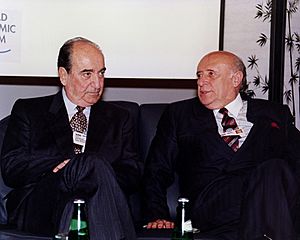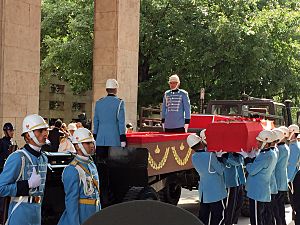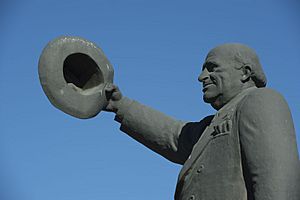Süleyman Demirel facts for kids
Quick facts for kids
Süleyman Demirel
|
|
|---|---|
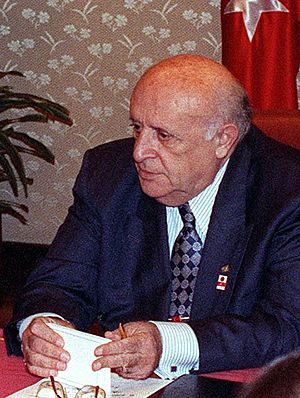 |
|
| 9th President of Turkey | |
| In office 16 May 1993 – 16 May 2000 |
|
| Prime Minister | Tansu Çiller Necmettin Erbakan Mesut Yılmaz Bülent Ecevit |
| Preceded by | Turgut Özal |
| Succeeded by | Ahmet Necdet Sezer |
| 12th Prime Minister of Turkey | |
| In office 20 November 1991 – 16 May 1993 |
|
| President | Turgut Özal |
| Deputy | Erdal İnönü |
| Preceded by | Mesut Yılmaz |
| Succeeded by | Erdal Inönü (acting) |
| In office 12 November 1979 – 12 September 1980 |
|
| President | Fahri Korutürk |
| Preceded by | Bülent Ecevit |
| Succeeded by | Bülend Ulusu |
| In office 21 July 1977 – 5 January 1978 |
|
| President | Fahri Korutürk |
| Deputy | Necmettin Erbakan Alparslan Türkeş |
| Preceded by | Bülent Ecevit |
| Succeeded by | Bülent Ecevit |
| In office 31 March 1975 – 21 June 1977 |
|
| President | Fahri Korutürk |
| Deputy | Necmettin Erbakan Turhan Feyzioğlu Alparslan Türkeş |
| Preceded by | Sadi Irmak |
| Succeeded by | Bülent Ecevit |
| In office 21 October 1965 – 16 March 1971 |
|
| President | Cemal Gürsel Cevdet Sunay |
| Preceded by | Suat Hayri Ürgüplü |
| Succeeded by | Nihat Erim |
| Deputy Prime Minister of Turkey | |
| In office 20 February 1965 – 21 October 1965 |
|
| Prime Minister | Suat Hayri Ürgüplü |
| Preceded by | Kemal Satır |
| Succeeded by | Atilla Karaosmanoğlu Sadi Koçaş (1971) |
| Leader of the True Path Party | |
| In office 24 September 1987 – 16 May 1993 |
|
| Preceded by | Hüsamettin Cindoruk |
| Succeeded by | Tansu Çiller |
| Leader of the Justice Party | |
| In office 28 November 1964 – 16 October 1981 |
|
| Preceded by | Ragıp Gümüşpala |
| Succeeded by | Party abolished |
| Member of the Grand National Assembly | |
| In office 29 November 1987 – 16 May 1993 |
|
| Constituency | Isparta (1987, 1991) |
| In office 10 October 1965 – 12 September 1980 |
|
| Constituency | Isparta (1965, 1969, 1973, 1977) |
| Personal details | |
| Born | 1 November 1924 Atabey, Isparta, Turkey |
| Died | 17 June 2015 (aged 90) Ankara, Turkey |
| Cause of death | Respiratory tract infection |
| Resting place | Atabey, Turkey |
| Political party | Justice Party, True Path Party |
| Spouse |
Nazmiye Demirel
(m. 1948; died 2013) |
| Alma mater | Istanbul Technical University |
| Profession | Civil engineer |
| Signature | |
Süleyman Sami Demirel (born November 1, 1924 – died June 17, 2015) was an important Turkish politician and engineer. He served as the 9th President of Turkey from 1993 to 2000. Before becoming president, he was the Prime Minister of Turkey seven times between 1965 and 1993. He also led two major political parties: the Justice Party (AP) and the True Path Party (DYP).
Süleyman Demirel was seen as a future leader by Adnan Menderes. He became the head of the Justice Party in 1964. In 1965, his party won many votes, and he became Prime Minister. He was the first Prime Minister born after the Republic of Turkey was founded. He won another election in 1969. His economic plans helped the country, but he resigned after some disagreements. He became Prime Minister again several times. However, a military takeover in 1971 ended his first long period as leader.
Demirel led the opposition from 1971 to 1975. He then formed new governments in the late 1970s. Another military takeover in 1980 stopped him from being involved in politics for a while. He returned to politics in 1987 and became the leader of the True Path Party. In 1991, he won the election and became Prime Minister for the last time. After President Turgut Özal passed away, Demirel was elected President in 1993. He served as President until 2000. His time as Prime Minister, over 10 years, is one of the longest in Turkish history.
Contents
Early Life and Family
Süleyman Demirel was born on November 1, 1924, in İslamköy, a small town in Isparta Province, Turkey. His parents were Hacı Yahya Demirel and Hacı Ümmühan Demirel. When he was a child, he worked as a shepherd. He went to elementary school in his hometown. Later, he attended middle and high schools in Isparta, Muğla, and Afyon. In 1948, he married Nazmiye Şener, who was his cousin.
Becoming an Engineer
Süleyman Demirel studied civil engineering at the Istanbul Technical University. He graduated in 1949. After graduating, he worked for the government in electrical power planning. He traveled to the United States in 1949 and 1954 to study irrigation, electrical technology, and dam building.
He worked on the Seyhan Dam as a project engineer. In 1954, he became the Director of the Department of Dams. The next year, in 1955, he was made the Director General of the State Hydraulic Works (DSİ). In this role, he oversaw the building of many power plants, dams, and irrigation systems. In 1954, he was chosen by the Eisenhower Fellowships to represent Turkey.
After a military takeover in 1960, he served in the Turkish Army. After his military service, he worked as a freelance engineer. He also taught hydraulic engineering part-time at the Middle East Technical University (ODTÜ) in Ankara.
Starting in Politics
Demirel's political journey began when he joined the executive board of the Justice Party. This party was formed after the Democrat Party was banned following the 1960 military takeover.
A journalist named Cihat Baban wrote that President Cemal Gürsel wanted Demirel to lead the Justice Party. Demirel's way of speaking and his background from a village made him popular with voters in the countryside.
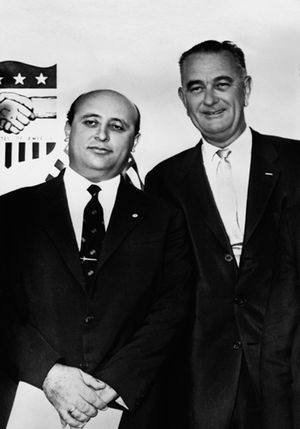
In 1964, after the death of the party's previous leader, Ragıp Gümüşpala, Demirel ran to become the new chairman. He won the election and became the chairman of the Justice Party on November 28, 1964.
Under his leadership, the Justice Party won a large number of votes in the 1965 general election. They formed a government, and Demirel became Prime Minister at the age of 40. This made him the youngest Prime Minister in Turkish history at that time.
First Time as Prime Minister
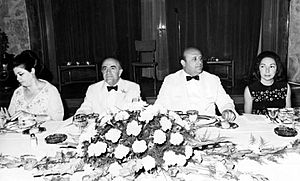
Demirel was part of a new generation of leaders born in the 1920s. These leaders were taking over from older politicians who had been involved in the Turkish War of Independence.
One of his first challenges was a "Presidential crisis." The current president, Cemal Gürsel, was too ill to continue. Demirel suggested that the Chief of the General Staff, Cevdet Sunay, become president. This helped to improve relations with the army. Sunay became president in 1966.
In the next elections in 1969, his party won again by a large margin. During his time as Prime Minister, important projects began. These included the Keban Dam, the Bosphorus Bridge, and an oil pipeline. His economic plans helped to control inflation, and Turkey's economy grew quickly.
However, there were protests and strikes by university students in 1968. This led to political problems, which worried the Turkish military. Demirel also faced issues within his own party. In 1970, some members left to form new parties.
Challenges in the 1970s
The economy worsened, and there were large worker protests. Disagreements between the government and the military grew, especially over the Cyprus dispute. Tensions with Greece also increased. There was also conflict between different political groups. These issues made Demirel's first time as Prime Minister very unstable.
He resigned as Prime Minister after his budget was not approved by parliament. But he quickly formed a new government. On March 12, 1971, the military intervened directly in politics. Demirel resigned, and a new government was formed with military support.
In 1973, Demirel worked with Bülent Ecevit, the new leader of the Republican People's Party (CHP). They agreed to support Fahri Korutürk for president, and he was elected.
Nationalist Front Governments
In the 1973 general election, Demirel's Justice Party came in second. A coalition government was expected, but Demirel said they could not work with the CHP. Instead, the CHP formed a government with an Islamist party. This government later fell apart.
On March 31, 1975, Demirel formed a new government. It was a coalition of right-wing parties, known as the "First Nationalist Front." To keep this government together, supporters of the Islamist and ultranationalist parties were hired into government jobs. This made the political violence of the 1970s worse. The country also faced economic problems due to rising oil prices and high inflation.
In the 1977 elections, the Justice Party lost to the CHP. But the CHP could not form a government. So, Demirel became Prime Minister again, forming the "Second Nationalist Front." This government also fell apart in December 1977.
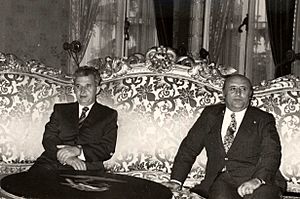
Problems like an American arms embargo, inflation, and increasing political violence continued. In 1979, Demirel became Prime Minister again, leading a minority government. His government worked on economic changes to move Turkey towards a more open market.
As President Korutürk's term ended, there was a crisis because politicians could not agree on a new president. Demirel's government lasted until a military takeover on September 12, 1980. This event banned him from politics.
During his time as Prime Minister between 1965 and 1980, Demirel helped open many religious schools.
Banned from Politics
After the military takeover in 1980, Demirel was held under watch for a month. He resigned as chairman of the Justice Party when it was closed down in 1981. A new law banned him and most other politicians from politics for 10 years.
However, he stayed in touch with former party leaders. When new political parties were allowed in 1983, Demirel did not support the parties that the military tried to create. He also did not support the Motherland Party led by Turgut Özal. A new party, the Great Turkey Party, was formed by former Justice Party members, but it was quickly banned. Demirel and other politicians were held for four months for breaking the political ban.
Last Time as Prime Minister
In 1986, Demirel worked to lift the ban on politicians who had been active before 1980. A public vote was held on this issue in 1987, and the ban was removed. Just 18 days later, he was elected chairman of the True Path Party (DYP). This was a new party that followed the ideas of the Justice Party. He was re-elected as a Member of Parliament for Isparta in the 1987 general election.
After the 1991 election, Süleyman Demirel became Prime Minister again. He led a coalition government with the Social Democratic Populist Party. During this time, he recognized that Kurds were a different ethnic group from Turks. He also changed some laws and approved international agreements on workers' rights. A social security program called "Green Card" was started, and the age requirement for retirement was removed.
Becoming President
After President Özal passed away suddenly, Demirel was elected the ninth President of Turkey in 1993 by the Grand National Assembly. He resigned from his party leadership. His successor as leader of the True Path Party was Tansu Çiller, who became Turkey's first female prime minister.
President Demirel faced some criticism for his comments after the Sivas Massacre. In this event, 35 people died when a hotel was set on fire by a mob. He said that it was an isolated incident caused by strong provocation.
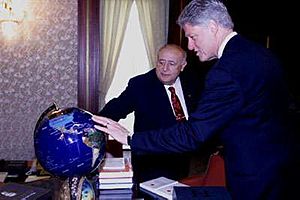
In 1996, Demirel survived an attempt on his life during a ceremony in İzmit. The person who tried to shoot him said he only wanted to protest Turkey's military agreement with Israel.
Demirel's role in the 1997 "Postmodern Coup" is debated. Some people say he helped bring down the government at that time. Others say he helped prevent a full military takeover by calming the situation. He did not appoint his close colleague Tansu Çiller as prime minister. Instead, he appointed Mesut Yılmaz.
In 1997, he received an award from a foundation whose honorary chairman was Fethullah Gülen.
Even though there was an attempt to extend his time as president, Demirel stepped down on April 5, 2000. He handed over his duties to Ahmet Necdet Sezer on May 16, 2000. After his retirement, his total time as Prime Minister was shorter than only İsmet İnönü's and Recep Tayyip Erdogan's.
Later Life and Passing
After leaving politics, Demirel often spoke at events, especially at universities in Turkey. His wife, Nazmiye, passed away on May 27, 2013. She had been treated for Alzheimer's.
Süleyman Demirel died on June 17, 2015, at a hospital in Ankara. He had been treated for a respiratory infection. After state and religious ceremonies, his body was taken to a special tomb in his hometown of Atabey, Isparta. The Süleyman Demirel Mausoleum was finished and opened to visitors in 2019.
His Legacy
Demirel achieved many firsts in his political career. He formed the most governments and was one of the longest-serving prime ministers in Turkish history. He was also the youngest prime minister at 40 years old. He was the youngest person to become a party leader at 40, and the youngest general manager appointed to a public institution at 30.
Some people said he moved away from the ideas of Mustafa Kemal Atatürk, but he denied this.
Several places are named after him, including the Süleyman Demirel Airport and Süleyman Demirel University in Isparta. The Süleyman Demirel Stadium in Antalya and the Süleyman Demirel Medical Centre in Erzurum are also named after him. There is also a Suleyman Demirel University in Kazakhstan. Two important main streets in Istanbul and Muğla also carry his name. In 2014, the Süleyman Demirel Democracy and Development Museum opened in Isparta.
Awards and Honors
Süleyman Demirel received many awards from different countries:
- Poland :
 Order of the White Eagle, 1993
Order of the White Eagle, 1993 - Croatia :
 Grand Order of King Tomislav, 1994
Grand Order of King Tomislav, 1994 - Kyrgyzstan :
 Order of Manas, 1998
Order of Manas, 1998 - Azerbaijan :
 Istiglal Order, 1999
Istiglal Order, 1999 - Italy :
 Order of Merit of the Italian Republic, 1996
Order of Merit of the Italian Republic, 1996 - Estonia :
 Order of the Cross of Terra Mariana, 1997
Order of the Cross of Terra Mariana, 1997 - Romania :
 Order of the Star of Romania, 1999
Order of the Star of Romania, 1999 - Georgia :
 Order of the Golden Fleece, 1999
Order of the Golden Fleece, 1999 - Bulgaria :
 Order of Stara Planina, 1999
Order of Stara Planina, 1999 - Germany :
 Order of Merit of the Federal Republic of Germany, 2000
Order of Merit of the Federal Republic of Germany, 2000 - Kazakhstan :
 Order of the Leopard, 2001
Order of the Leopard, 2001 - Moldova :
 Order of the Republic, 2004
Order of the Republic, 2004 - Azerbaijan :
 Sharaf Order, 2013
Sharaf Order, 2013
See also
 In Spanish: Süleyman Demirel para niños
In Spanish: Süleyman Demirel para niños
- Conservatism in Turkey
 | Delilah Pierce |
 | Gordon Parks |
 | Augusta Savage |
 | Charles Ethan Porter |


